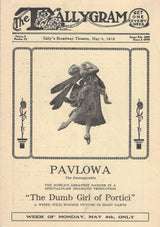Milestone Films
Dumb Girl of Portici, The (by Lois Weber)
Click here to stream now on:
Two Disc Deluxe Set!
“Pavlova’s artistry is something that we are often asked to take on faith, something where you had to be there. Watching The Dumb Girl, you are there!” — Joan Acocella, The New Yorker
In the early 20th century, when few stars were known by name, no woman had greater worldwide fame than ballet dancer and choreographer Anna Pavlova. Unlike movie actresses, whose celebrity spread with the international distribution of their films, Pavlova’s renown had to be earned theater by theater, performance by performance. Her legendary art was, by its nature, ephemeral. Still, no one traveled farther or worked harder than this slight daughter of a Russian laundress.
Acting as star, choreographer, producer, and boss of a large dance company constantly touring the globe, Pavlova was a consummate artist and a canny businesswoman. A generation marveled and cherished the memory of her scintillating brilliance on stage. The restoration of The Dumb Girl of Portici — with the dazzling new score by dance composer John Sweeney — will give today’s audiences a chance to experience the energy, the expressive face, and the grace of the great Pavlova.
The Dumb Girl of Portici is a previously unseen film long overdue for recognition as one of Weber’s finest creations and a landmark in women’s cinema. The production was one of Universal’s most expensive to date and featured an enormous cast, many large-scale sets, and an ambitious story. It was the first blockbuster ever directed by a woman — and arguably the only epic shot by a woman in the 20th century.
For Weber, the chance to work with Pavlova was a once-in-a-lifetime opportunity. A Russian émigré who made her home in London, the dancer was “stuck” in America as World War I raged in Europe. Pavlova was currently appearing with the Boston Opera Company in D.F. E. Auber’s 1829 La Muette de Portici, portraying a mute girl (dance often was a major part of early opera) — a role that could be fortuitously carried over to silent film. Fenella, a wordless fisher-girl living during the Spanish occupation of Naples in the mid-17th century, is seduced and abandoned by a Spanish nobleman. As a result of this betrayal and the oppression of their people, Fenella’s brother foments a revolution. The opera’s premiere in Belgium did in fact inflame a revolt and the story goes that the opera’s performance is still banned in that country.
In order to purchase and save the almost-bankrupt Boston Opera Company, Pavlova agreed to Universal’s enormous offer of $50,000 to portray Fenella in Weber’s film. Universal also agreed to the unusual request to shoot in Chicago, where Pavlova was performing, as well as in California.
Sadly, over the years The Dumb Girl of Portici has fallen out of distribution and out of favor. The only versions known to have survived were a 35mm nitrate reissue print dating from the 1920s preserved at the British Film Institute and a 16mm print at the New York Public Library’s Performing Arts Library. The Library of Congress’s archivists George Willeman and Valerie Cervantes used the 16mm to complete the existing 35mm print in order to bring the film back closer to the original version. Further restoration by An Affair With Film’s Lori Raskin stabilized and cleaned up the restoration and added the original tinting. Information on those original tints was recently discovered in the microfilm files of NBC/Universal. Thanks to these restoration efforts, projection at the proper film speed, and the brilliant score by John Sweeney, The Dumb Girl of Portici and prima ballerina Anna Pavlova will delight modern audiences.
“Pavlova’s performance in the movie is no fluke or stunt—it’s a fully realized, deeply committed performance that reveals Pavlova to be, from the very start, one of the greatest movie actors… Her style offers something of a forerunning blend of Greta Garbo and Joan Crawford, with the terrifying intensity of her performance matching an impenetrable and implacable mystery; her sense of physical command seems nonetheless wildly spontaneous; her dramatic expressivity appears painfully impulsive. For all the theatricality of the performance and the artifice of the spectacle, Pavlova has the rare quality of cinematic aliveness and immediacy that leaps out of its context and its story to appear ever-modern.
Weber’s bold and imaginative direction has its own independent artistic identity, in which the composition of images for and with Pavlova is only one part… She invests “The Dumb Girl of Portici” with a strong and bracing physical power… “The Dumb Girl of Portici” is a crucial rediscovery—as are the art of Weber over all and, for that matter, the celebration of Pavlova’s single screen performance and regret that there were no others. Along with the specifics of their genius, “The Dumb Girl of Portici” is a welcome reminder that the history of cinema still belongs to the future.” — Richard Brody, New Yorker Magazine
The Blu-ray and DVD of The Dumb Girl of Portici include several remarkable bonus features:
- The Immortal Swan, 1935, directed by Edward Nakhimoff, produced by Victor D'Andre. 48 minutes.
- Anna Pavlova Dancing, 1925, produced by Douglas Fairbanks, 13 minutes.
- Anna Pavlova in Newsreels, 1920s, 2 minutes.
- Pavlova Home Movies, 1920s, 13 minutes.
An Explanation of Home, Classroom, and Public Performance Rights
Through our distribution partner, Kino Lorber, Milestone provides a variety of licensing to suit all needs. Our standard institutional licensing packages are designed to provide colleges, universities and qualified non-profits with the best value for multiple uses, and our one-time community screening licenses allow any organization to exhibit high-quality films for a reasonable fee. Please note that all licensing carries restrictions on audience numbers and/or geographic range.
STANDARD INSTITUTIONAL LICENSING
- CLASSROOM RIGHTS allow unlimited use in face-to-face classroom situations for the life of the media, restricted to a single campus or location. Please note that this license doesn't include public screenings or digital transmission of any kind.
- PUBLIC PERFORMANCE RIGHTS (PPR) allow educational and nonprofit groups to exhibit our films to groups of 100 or fewer individuals where admission is not charged. The term of the public performance license is for the life of the DVD. However, if you intend to charge admission, expect an audience over 100, or publicly advertise the screening, then we ask that you contact us regarding an exhibition fee. Films purchased without Public Performance Rights are restricted for individual viewing or face-to-face teaching in the classroom only.
- DIGITAL SITE LICENSES (DSL) allow colleges, universities and nonprofits to locally host and stream to their community on a closed, password-protected system for the life of the digital file.
- K-12 PPR comes with limited performance rights so films can be shown in classrooms, at PTA meetings, during after school programs, and transmitted on a closed-circuit system within a K-12 school building or on a single campus.
For all educational licenses and screenings, please Estelle Grosso, Director of Educational and Non-Theatrical Sales & Distribution at Kino Lorber (Milestone’s distribution partner) at: egrosso@kinolorber.com.
The purchase of DVDs, DVD-Rs, and Blu-rays at the institutional rate by anyone outside of a North American non-profit educational institution does not grant rights for public performance or streaming.
Any continuous or loop screenings as part of a museum exhibition must also be licensed separately. Inquiries must be negotiated directly by emailing egrosso@kinolorber.com.
Information for Exhibitors Screening DCPs and Film Prints
All bookings must be made by email correspondence with George Schmalz, Director of Theatrical Sales at Kino Lorber (Milestone’s distribution partner) at: gschmalz@kinolorber.com to negotiate terms and insure a screening copy is available. An order is only finalized when Kino Lorber sends written confirmation.
DCPs are shipped insured for their cost via Federal Express or UPS and must be returned the same way or by an equivalent method. Shipping and handling charges for outgoing DCPs appear on your invoice. The immediate return or transshipment (as directed) of all DCPs is your responsibility.
DCPs should be returned to:
Milestone Film & Video
38 George Street
Harrington Park, New Jersey 07640-0128
United States
35mm and 16mm prints are shipped insured for their cost via Federal Express or UPS and must be returned the same way or by an equivalent method. Please do not ship prints back via US Mail. Exhibitor pays to ship both ways. Shipping and handling charges for outgoing prints appear on your invoice. The immediate return of all prints is your responsibility.
Prints should be returned insured for $1,000 to:
Iron Mountain
Attn: Milestone Account
235 Main Street
Little Falls, NJ 07424
201.944.3700
For public screenings, advertising materials can be requested by contacting jhertzberg@kinolorber.com.
Milestone is the exclusive licensor for all the titles in this catalog, all of which are available from Milestone’s distribution partner Kino Lorber. in their complete versions.










